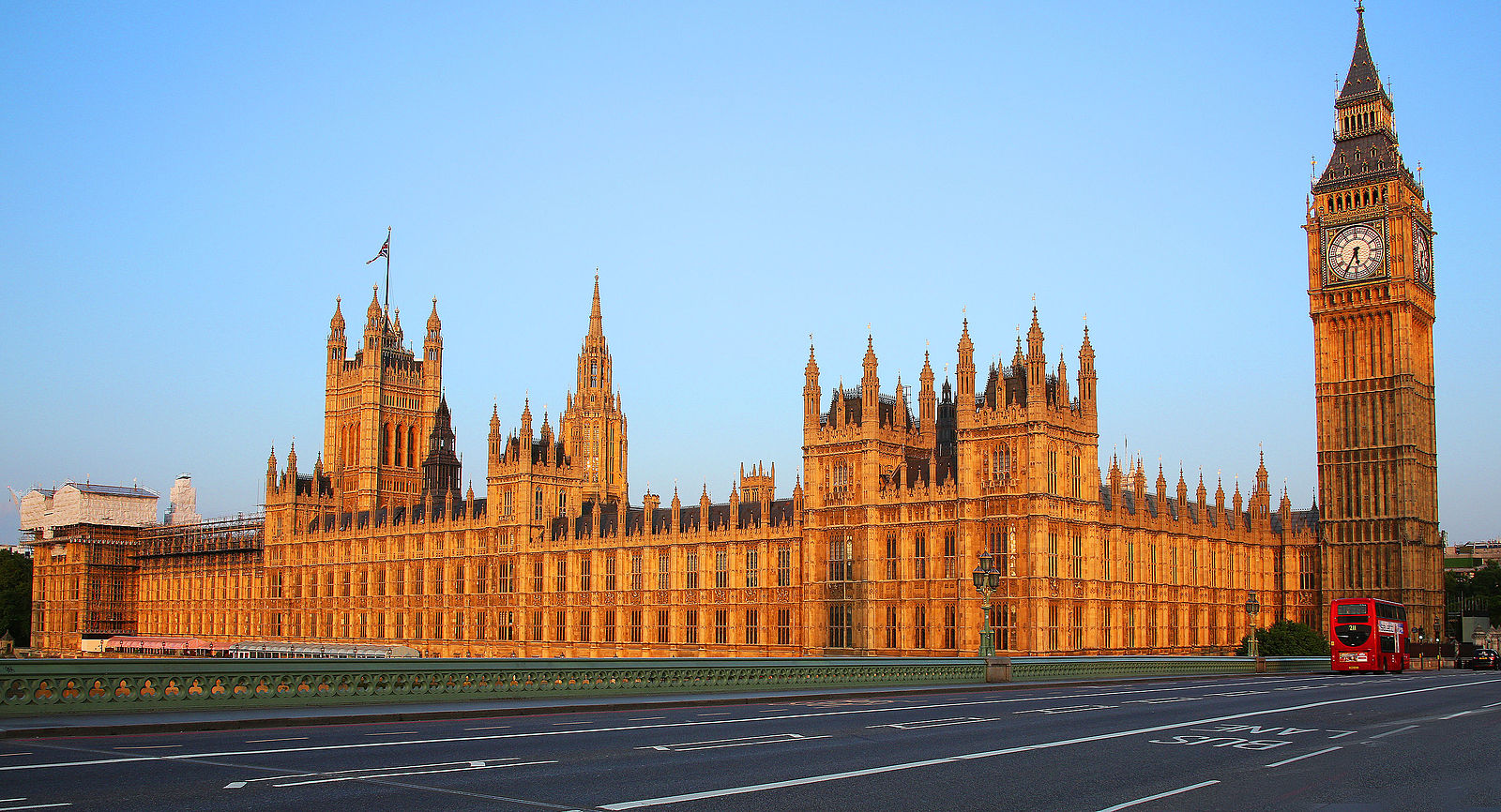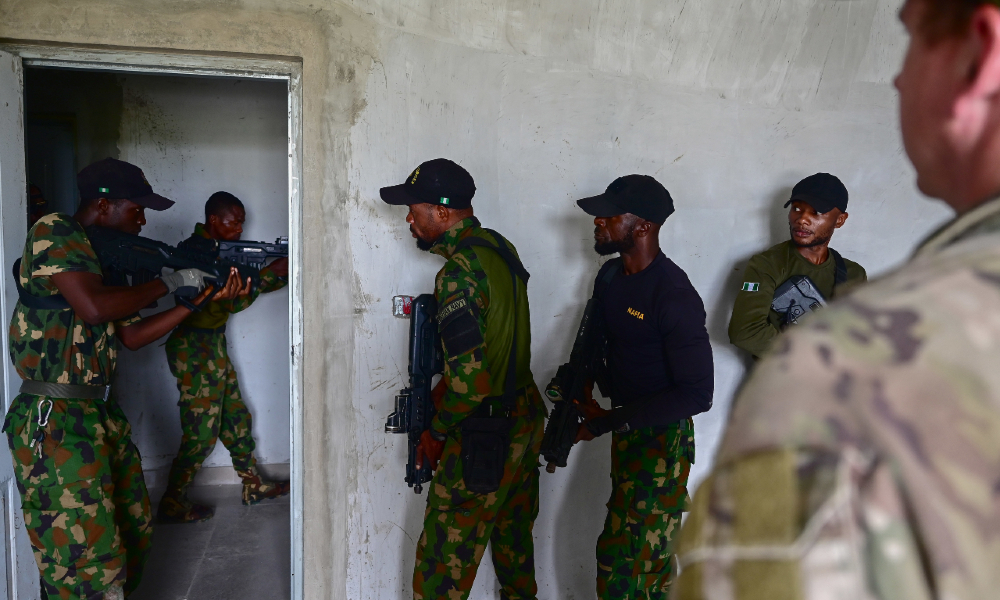All You Need to Know About the U.K. Proscribing the Neo-Nazi Group Atomwaffen Division
The U.K. proscribed the U.S.-based neo-Nazi group Atomwaffen Division as a terrorist organization. The move appears to be more for international solidarity and to provide tools to combat online propaganda than one of current and direct operational necessity.

Published by The Lawfare Institute
in Cooperation With

On April 23, the U.K. officially proscribedthe U.S. accelerationist neo-Nazi group Atomwaffen Division and its alias, National Socialist Order, as a terrorist organization. This designation follows Canada’s similar movein February and comes after the group’s members have been linkedto five murders, explosions and hate crimes in the U.S. With group proscription under the Terrorism Act 2000carrying sentences of up to 14 yearsfor members or those who invite support to the group, designation seems to be a step forward in the fight against white nationalism and right-wing terrorism. But because the group seems to lack a physical presence in the U.K., the move appears to be more for international solidarity and to provide tools to combat online propaganda than one of current and direct operational necessity.
Background
Named after the German word for nuclear weapons, Atomwaffen Division originated in 2015 when it broke awayfrom the fascist Iron March forum. Atomwaffen Division promotesthe violent overthrow of the U.S. government, incitement of a race war, and the establishment of a new society based on national socialism and white supremacy. It endorses these aims through “swatting” and direct acts of violence, with notorious attacks including those at the 2017 Unite the Right rallyin Charlottesville, Virginia; the 2017 killingof Buckley Kuhn-Fricker and Scott Fricker, neo-Nazi Nicholas Giampa’s girlfriend’s parents; and the 2018 killingof openly gay, Jewish college student Blaze Bernstein. Most recently, an Atomwaffen Division leader, Cameron Shea, pled guiltyto federal conspiracy and hate crime charges after threatening journalists and advocates who shed light on anti-Semitism. While the Division operates primarily in the U.S. via decentralized cells, it has linksto, and affiliates in, the U.K., Germany, Russia, Ukraine and the Baltic states. In March 2020, after law enforcement pressure, Atomwaffen Division leader James Mason announcedthat the group was disbanding. In late July 2020, however, Division members declaredthat they had reorganized themselves as the National Socialist Order—the name under which the group still operates.
With Atomwaffen Division based in the U.S., what does the threat look like across the pond? The Division, of course, breaches the U.K.’s borders via the internet, where its members advocatefor violence and glorifyacts of terror. However, the specific, physical threat emanating from Atomwaffen Division on the ground in the U.K.—in terms of members and cells—is seemingly negligible or nonexistent. Still, the threat stemming from related and affiliated right-wing terrorist groups is sinister and real. Nearly one-thirdof terror plots foiled by British police since 2017 relate to right-wing ideology, and the youngest Brit ever sentenced for a terror-related offense was the U.K. headof the affiliated white supremacist group Feuerkrieg Division. As of Dec. 31, 2020, 42 (20 percent) of the people in custody for terrorism-connected offenses in Great Britain were categorizedas holding right-wing ideologies.
Before being designated a terrorist organization, Atomwaffen Division and its members could be held accountable in the U.K. only under domestic criminal law. Proscription, however, opens the door to a whole host of governmental resources. Once proscribed, a designated organization is subject to asset freezing and seizure, in addition to disruptive activityincluding the use of immigration powers like exclusion, prosecution for other offenses, encouragement of the removal of online material and EU asset freezes. In addition, the penalties for the proscription offenses of membershipor support(Terrorism Act 2000, Sections 11 and 12) are a maximum of 14 yearsin prison and/or a fine; the penalties for the offense of wearing a uniform or publishing an image(Terrorism Act 2000, Section 13) are a maximum of six months in prison and/or a fine of £5,000 at most. To be removed from the list of proscribed terrorist organizations, groups must apply to the secretary of state and, if the secretary of state refuses, they may appealto the Proscribed Organizations Appeal Commission.
Proscription Under the Terrorism Act 2000
Atomwaffen Division is the firstU.S. organization on the U.K.’s proscribed terrorist group list (Schedule 2of the Terrorism Act 2000). The U.K. has previously proscribed three similar neo-Nazi groups: National Action in December 2016, Sonnenkrieg Division (SKD) in February 2020and Feuerkrieg Division (FKD) in July 2020(the latter two being German for “sun war” and “fire war,” respectively). Notably, back in 2018, Sonnenkrieg Division members suggestedPrince Harry should be shot for being a “race traitor.” While some sources refer to SKD as a U.K. affiliateof Atomwaffen Division, others, including Member of Parliament Brian Paddick, understandSKD to be the name for Atomwaffen Division’s U.K. branch—though Minister of State for the Home Office Susan Williams rebuttedthis suggestion.
On April 19, U.K. Secretary of State for the Home Department Priti Patel laid a proscription orderbefore Parliament to amend the Terrorism Act 2000to include Attomwaffen Division. Patel’s decision followed a meetingof the Proscription Review Group, which examinesavailable evidence to help support the home secretary in her decision-making process. After both the House of Lords and the House of Commons approved the order by resolution on April 22, the lawcame into force on April 23. Under Section 3(5) of the Terrorism Act 2000, the secretary of state has the power to proscribe an organization that “commits or participates in acts of terrorism, prepares for terrorism, promotes or encourages terrorism, or is otherwise concerned in terrorism.” The law further clarifiesthat promoting or encouraging terrorism for the purposes of this subsection:
includes any case in which the activities of the organization—include the unlawful glorification of the commission or preparation (whether in the past, in the future or generally) of acts of terrorism; or are carried out in a manner that ensures that the organization is associated with statements containing any such glorification.
Even if an organization meets the statutory criteria for proscription, the secretary of state can exercise discretion with reference to the following factors(as announcedby the secretary of state in 2001): (1) the nature and scale of the organization’s activities, (2) the specific threat that it poses to the U.K., (3) the specific threat that it poses to British nationals overseas, (4) the extent of the organization’s presence in the U.K., and (5) the need to support international partners in the fight against terrorism.
The amendment’s Explanatory Memorandum—drafted by the Home Office—seemingly addresses factors 1 and possibly 2, although it arguably does not address factors 3 through 5. In fact, in the House of Commons debate, Parliamentary Under-Secretary of State for the Home Department Chris Philp characterizedthe group as one “without a physical presence in the U.K.” but with “an established online presence”—in correlation to factor 4 and potentially weighing against proscription. Williams sharedthe same information in the House of Lords debate, during which John Morris also laudedthe “preventive nature of the order.” Without the group having significant presence in the U.K., then, the decision seemingly leans on the symbolic effect of proscription, and it likely “saysmore about the United Kingdom’s international relationships than the operational need to bear down on a particular group.” And, as Independent Reviewer of Terrorism Legislation Jonathan Hall states in the Terrorism Acts in 2018 Report, invocation of factor 5 “emphasizes the importance of ensuring the fundamental statutory criterion, ‘is concerned in terrorism’ is met.”
Future Prospects
Though it might come as a welcome relief to some that the U.K. government has included another non-Islamist organization in its list of proscribed terrorist groups, especially after related controversiesover the government’s counterextremism policy—referred to as Prevent—and the government’s definitionof “extremism” (though newdefinitions have recently been proposed), the U.K. government’s move might bring with it an onslaught of other issues.
In bothparliamentary debateson the proscription, members of Parliament spoke about the Home Office’s continued work to tackle the spread of terrorist content online, including through the Global Internet Forum to Counter Terrorism. While a powerful toolto disrupt terrorist content and propaganda online, especially through the use of its Hash Sharing Consortium, this forum has also faced its fair share of skepticism. Concernswith policy over online content moderation can also be seen on the uniquely domestic front, especially vis-a-vis the government’s views on private regulation of online speech as expressed in an Online Harms White Paperand the newly drafted Online Safety Bill (Online Harms)
Separate from the issue of online content moderation, the recent proscription raises questions about the U.K. government’s Counterterrorism Act and whether it’s fit for the purposefor which it was recently used. Granted, there are a number of U.N. Security Council resolutions, including 1267 and 1373, regarding the notion of designation and the creation of domestic terrorist lists. There are also resolutions regarding the criminalization of terrorist financing, including 2178 and 2462. But when the terrorist threat is not necessarily immediate or physical, but is confined to the cyber world or attenuated across borders, it is possible that the employed paradigm might be a different one from that to counter immediate, physical threats. For those concerned with the direction of these discussions, the seventh reviewof the U.N. Global Counter-Terrorism Strategy in June is certainly one for the calendar.





